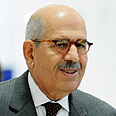
'Writing on the wall.' ElBaradei
צילום: AFP
Several thousand Egyptians protest police abuse
Opposition leader ElBaradei says demonstrations 'clear-cut message to regime that Egyptian people are sick and tired of practices that are inhumane'
Several thousand Egyptians, joined by top opposition leader Mohamed ElBaradei, protested on Friday what they call authorities' systematic use torture in the largest demonstration yet sparked by the alleged beating death of a young man by police this month.
The death of Khaled Said has become a rallying point for pro-reform activists and rights workers who say police abuse is rampant, made possible by a three-decade-old emergency law.
"It's a clear-cut message to the regime that the Egyptian people are sick and tired of practices that are inhumane," said ElBaradei after the protest in Alexandria.
"If they don't get the message then there is a problem with the regime, the writing is on the wall," he added, describing Said's death as a "heinous crime."
Witnesses say police officers dragged 28-year-old Said, a businessman, out of an Alexandria internet cafe and beat him heavily in the street.
The government maintains that Said died from suffocation after swallowing a packet of drugs - a claim met with derision by many after photos of Said's body were widely circulated, showing his body covered with bruises, his teeth broken and jaw smashed.
ElBaradei, a Nobel peace laureate and former chief of the UN's atomic watchdog agency who has become a leading voice for reform in his homeland, joined the around 3,000 protesters who held noon prayers in the Mediterranean port city of Alexandria and then demonstrated outside the mosque.
'This isn't about politics'
It was a rare case of ElBaradei joining one of Egypt's street protests from which he has largely remained aloof since returning to his country of birth, concentrating instead on gathering signatures for his campaign to change the constitution.
Demonstrators chanted once-taboo slogans against Egyptian President Hosni Mubarak and Interior Minister Habib el-Adly, who heads the police.
"Down, down, Hosni Mubarak," they chanted, calling el-Adly the "minister of torture."
Protesters pushed and shoved with black-garbed riot police who formed a tight cordon around the mosque, but the demonstration ended after several hours without significant violence in contrast to other gatherings that were violently dispersed.
At sunset, a second, silent, protest was held on the port city's sea front promenade, though its impact was blunted by a raucous parade organized by the local government-funded youth center celebrating Alexandria's nomination as this year's capital of Arab tourism.
Protests by hundreds have been held regularly in Cairo and several other cities since Said's June 6 death, with police beating and arresting protesters at the gatherings.
Rights groups have long said that police regularly abuse and torture people in detention and are rarely held accountable, a claim denied by the government. Security forces have wide powers of arbitrary arrest under the emergency law in place since Mubarak came to power, which the government says is necessary to fight terrorism but which activists say is a foundation for his autocratic regime.
The government has been faced with scattered protests in the past calling for economic or political reform, but the Said case could give a push to the democracy movement.
A number of those at the main protest had never joined previous demonstrations or been politically active.
One woman who answered an internet call to help organize the protest, Iman Hassan, vowed, "We will not be silent until we get our rights."
"When injustice prevails, no one matters anymore, we no longer have anything to fear. (Said) was like any of us, it could be me or my brother or anyone next," said Hassan, a hairdresser from Alexandria in her early 30s.
Despite rallies and a recent US call for an independent investigation, the government has stuck by its claims on Said's death. This week, a second autopsy was released repeating the earlier findings that the 28-year-old died from suffocation. The New York-based Human Rights Watch cast doubt on the new autopsy, urging the Egyptian government to investigate claims he was beaten to death.
Ahmed Mohammed, a 26-year-old friend and neighbor of Said who attended the protests, said the government claims are fueling the protests.
"We don't believe what's being said about him, that's why we're doing this. We will continue to do this until God shows the truth. This isn't about politics, he was a human being," he said.










